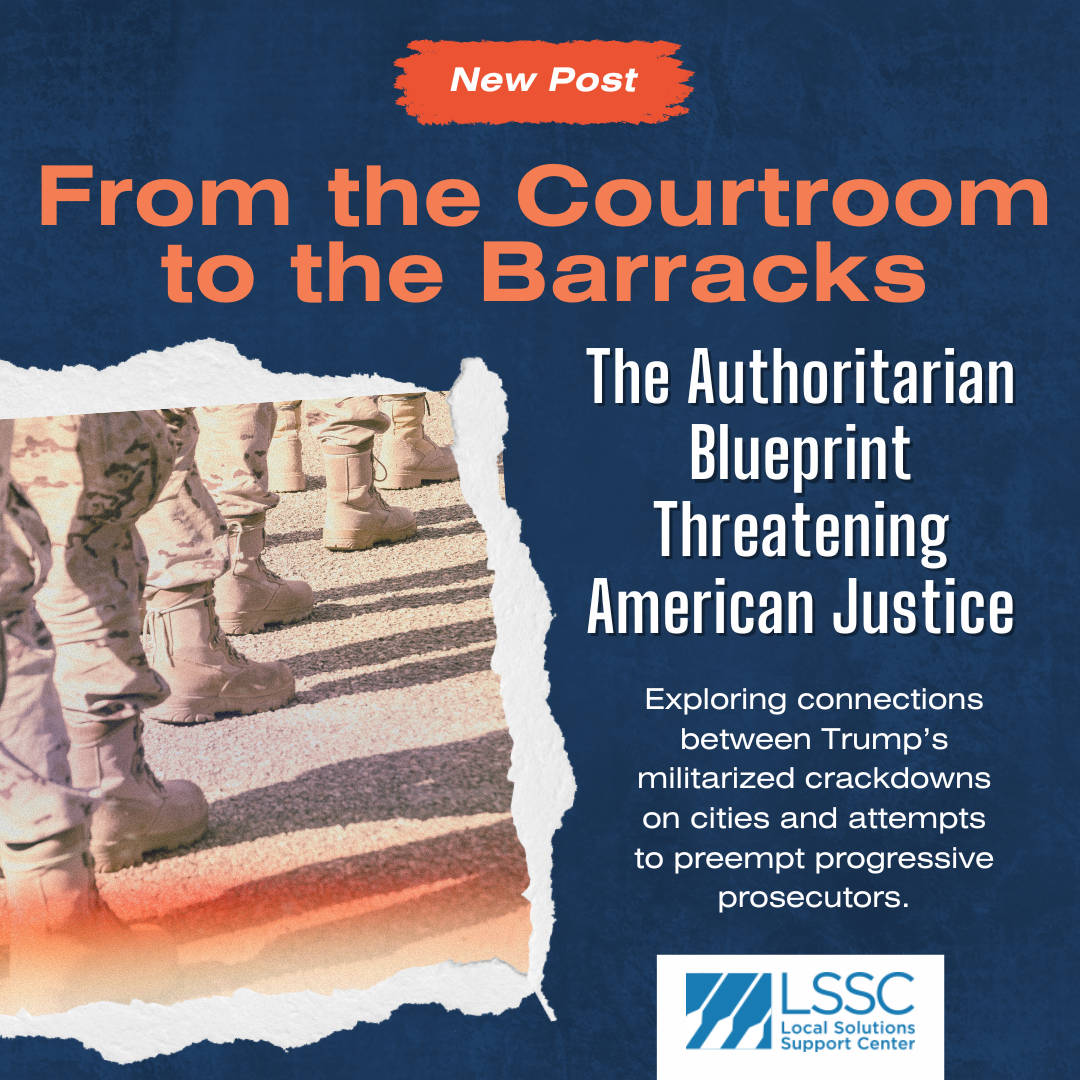From the Courtroom to the Barracks: The Authoritarian Blueprint Threatening American Justice
Post by Cristine Soto DeBerry
Donald Trump’s recent move to deploy the National Guard into American cities should alarm every American who values local democracy. While it may look like a standalone power grab, it’s actually part of a larger, coordinated effort to strip communities of their right to choose how they are governed. You can draw a straight line from these militarized crackdowns to the attacks on progressive prosecutors sweeping the nation. Together, they form an authoritarian blueprint: dismantle local control, crush independent voices, and replace them with centralized power loyal to the strongman at the top. It’s a blueprint we’ve seen supporters of abusive preemption lean into for more than a decade now.
Progressive prosecutors are not accidents of political fortune—they are the product of democratic movements. Voters in cities like Philadelphia, San Francisco, Chicago, and St. Louis elected them to end the failed policies of mass incarceration, prioritize serious and violent crime, and invest in strategies that actually keep people safe: prevention, treatment, and accountability rooted in fairness. These prosecutors were transparent about their goals, ran on them, and won.
Yet, almost as soon as they took office, Republican governors and legislatures began working to neutralize them. In Florida, Governor Ron DeSantis suspended Hillsborough County State Attorney Andrew Warren for refusing to criminalize abortion or prosecute people under laws he viewed as unconstitutional. In Pennsylvania, lawmakers tried to strip Philadelphia District Attorney Larry Krasner of his power after voters re-elected him by a landslide. In Texas, state leaders passed laws allowing the Attorney General to take over local prosecutions if a district attorney declines certain cases—part of a broader push to target reform-minded prosecutors in Houston, Austin, and beyond.
These attacks are not about public safety; they are about political control. That hunger for control is often a driving force behind preemption, too. And Trump’s National Guard play is no different. By sending troops into cities without local consent, Trump is signaling that he will override any local decision that does not align with his agenda. A mayor who prioritizes de-escalation over armed enforcement? A city council investing in housing instead of more policing? In Trump’s vision, these local choices can be bulldozed by federal force.
History offers plenty of warnings. From the “law and order” politics of the Nixon era to the use of federal troops against striking workers in the early 20th century, we know what happens when armed force is deployed to settle political disputes. The targets are never those with real power—they’re communities already under surveillance and over-policing, the same communities progressive prosecutors have sought to protect from unnecessary incarceration and criminalization.
What’s at stake here is not just one prosecutor’s job or one city’s autonomy. It’s the very idea that voters—not distant politicians or presidents—should decide how justice is administered in their own communities. Prosecutorial independence is a cornerstone of the rule of law. Without it, charging decisions become political weapons, wielded to punish dissent and reward loyalty.
Trump’s willingness to insert the military into civilian governance makes clear where this is heading. Authoritarian regimes rarely start with tanks in the streets—they begin by eroding local authority, removing independent actors, and normalizing state intervention in matters once decided locally. When those guardrails fall, military force becomes just another tool of political enforcement.
The fight to protect progressive prosecutors is inseparable from the fight against unauthorized militarized occupation of our cities. Both are about defending the principle that local communities—not political rivals, not hostile legislatures, not a president with a vendetta—get to choose their own leaders and policies. If we lose that, we lose far more than any single officeholder or local policy. We lose the foundational promise of self-government.
This is the moment to draw the line. Whether you voted for a progressive prosecutor or not, whether your city supports the National Guard’s arrival or opposes it, the principle at stake is the same: our right to decide for ourselves how we are governed and how justice is done.
Because once that power is taken away—once the courtroom and the barracks are both under the control of the same political hand—it won’t be easily won back.
Cristine Soto DeBerry is the Founder and Executive Director of the Prosecutors Alliance Action.

